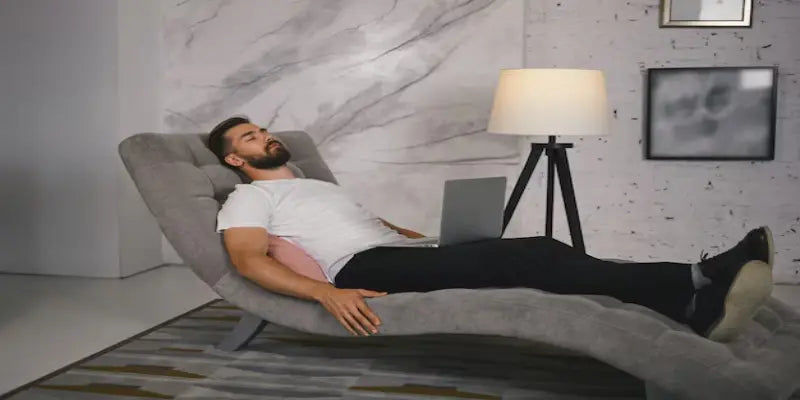
10 Tips to Create a Healthy Sleep Routine
You went to bed at 11:00 pm and now it is 1:00 am and you are staring at the ceiling, thinking if you’ll ever fall asleep? Or you wake up thinking it is time to wake up but it is only 4 in the morning?
If you find it difficult to fall asleep or wake up frequently at night, it is a sign that you need to change your sleeping habits and create a good bedtime routine.
In this blog, we’ll look into what are healthy sleep habits and how you can sleep better by making some small changes in your bedtime routine.
Tips for Healthy Sleep Routine
1. Stick to a fix sleep schedule
Fix your bedtime and wake up time and try to maintain it every day. This strengthens your body's sleep cycle (internal clock), making it easier for you to fall asleep and wake up each day.
Sleeping and waking up at same time everyday helps prevent tiredness and sleepiness during the daytime. It is advised that adults should sleep 7 to 8 hours every night.
2. Create a relaxing bedtime routine
A bedtime routine helps your mind to unwind and signals that it is time to go to sleep. You should follow a bedtime routine between 30 to 60 min before you go to bed.
You can add things to your routine that makes you feel relaxed but avoid adding devices that emit blue light as it can have a bad impact on sleep.
Here are some ideas of what you can add to your sleeping routine:
- You can do some meditation and yoga to calm your body and mind.
- Listen to relaxing music and focus on your breathing laying in the bed.
- Taking a warm water bath or shower to cool down your body temperature.
- Read a book, avoid using light emitting devices such a kindle to read as it will affect sleep.
- Do some light stretches to relax and release muscle tension.
Avoid doing things that are overwhelming like talking on the phone or working.
3. Create a calming sleep environment
Dim the light a few hours before sleeping, keep optimum room temperature, use earbuds in case you have a noise around. Invest in good quality pillow and mattresses so you can sleep comfortably.
It is advised to use a memory foam pillow as it adjusts according to your head and gives better support to the neck and spine. If you are suffering from neck or back pain, this is the perfect solution for you.
4. Exercise on daily basis
Try to engage in some physical exercise or workout for at least 30 minutes each day. It will help you sleep better at night. Avoid working out a few hours before bedtime as this can boost your energy levels and body temperature, making it more difficult for you to fall asleep.
5. Avoid caffeine after midafternoon
Caffeine can kick in between 3 and 7 hours after consumption. This implies that your afternoon cup of coffee may keep you awake and alert for far longer than you want.
Although it is generally recommended that you limit your caffeine intake to the early hours. Some people may be able to stretch their consumption until midafternoon, but others may need to stop considerably sooner in order to fall asleep easily.
6. Take short naps
Avoid taking longer naps during the day as it will keep you awake at night. Try to take power naps of less than 30 min. A 20 min nap is considered ideal and is way more powerful than longer naps.
If you are someone who is suffering from insomnia problem, avoid taking naps during the day.
7. Avoid heavy meals before bedtime
Your body needs time to digest food, so having a heavy dinner before bed can have a negative effect on your sleep quality. It may also trigger acid reflux symptoms, which might keep you awake.
Also, avoid consuming alcohol and nicotine, particularly before bedtime, as these might impair your sleep quality.
8. Use your bed just for sleep
If you are using your bed for reading, working, talking on the phone, watching TV, or other purposes, you must stop it. It may be tempting to use your comfy bed for all these things but it can impact your sleep.
You should only use your bed for sleep and one more exception is for sex. This helps your brain to strengthen the relationship with your bed and sleep, making it simpler to fall asleep.
Reading may help you relax before going to bed, but books can also interfere with your sleep if they keep your brain attentive. Try reading on the couch before heading to your bed.
9. Turn off all the electronic devices 1 hours before bedtime
Electronic devices, such as your phone, laptop or computer emit blue light, which can lower melatonin levels in your body. Melatonin is a hormone that regulates your sleep and wake cycle. When your levels drop, it may be more difficult to fall asleep.
Devices that generate blue light can also keep your brain attentive, making it more difficult to fall asleep.
10. Destress before going to bed
All of us have so much in mind of what happened today and many other thoughts, sleeping with a mind full of worries can keep you awake at night.
You can write down your anxieties before going to bed to get them off your mind. If your to-do list is stressing you out, write it down as well. Prioritize your tasks for tomorrow and the rest of the week, and then attempt to relax.
Conclusion
If you have a hard time falling asleep or you wake up frequently at night, you can work on creating a better bedtime routine for yourself that can help you fall asleep faster and stay asleep for longer periods of time.
Sticking to a fixed sleep schedule, having a calm nighttime routine, keeping your bedroom dark and at a comfortable temperature, and regulating what you eat and drink can all have an effect on how well you sleep.
If you continue to have problems with your sleep patterns or insomnia, consult your doctor. You can also try replacing your normal pillow to Sleepsia full body pillow. It is quite beneficial for people suffering from arthritis, as well as those with sore and stiff joints. The loft and firmness of the pillow are customizable. It's also chemical-free.








